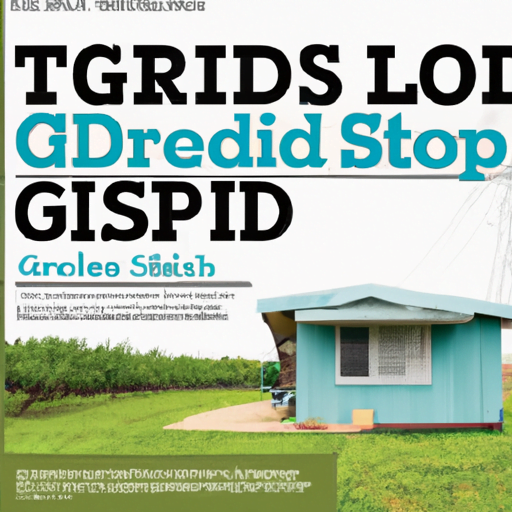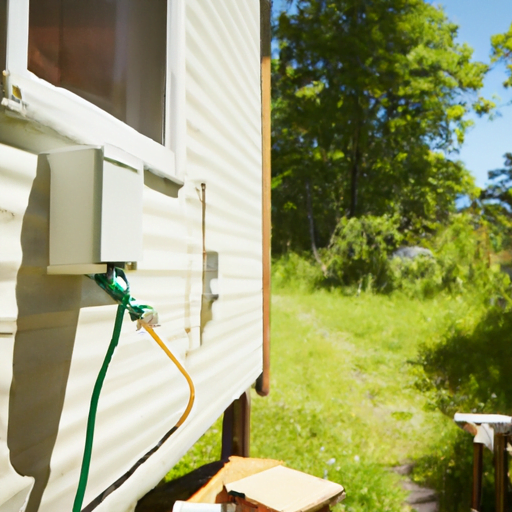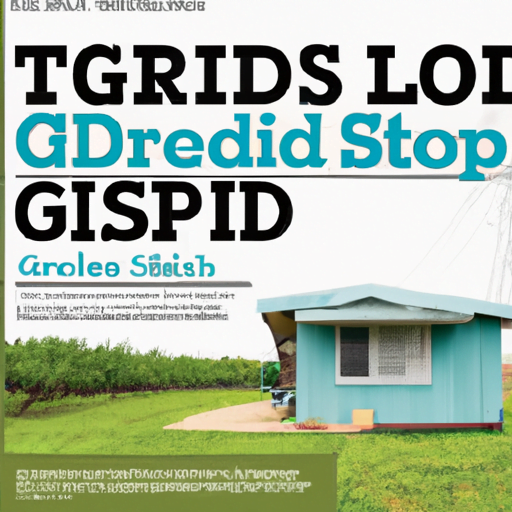So, have you ever wondered what it would be like to live off-grid in Texas? You know, completely self-sufficient, disconnected from the electrical grid, and living off the land? It might sound like a radical idea, but believe it or not, there are actually quite a few people who have embraced this lifestyle in the Lone Star State.
Living off-grid means relying on alternative sources of energy, such as solar power or wind turbines, and making sustainable choices when it comes to water and waste management. It’s a way of reducing your carbon footprint and embracing a simpler, more self-reliant way of life. And Texas, with its vast open spaces and abundance of natural resources, provides the perfect backdrop for off-grid living.
In this article, we’ll delve into the world of off-grid living in Texas, exploring the challenges and benefits of this lifestyle. We’ll look at how people are generating their own electricity, collecting and storing rainwater, and growing their own food. So, if you’ve ever been curious about what it takes to live off-grid in the great state of Texas, stick around and learn more!

Advantages of Off-Grid Living in Texas
Decreased Reliance on Public Utilities
Living off the grid in Texas offers numerous advantages, with one of the most significant being decreased reliance on public utilities. When you choose to live off the grid, you become self-sufficient in meeting your basic needs such as water, power, and waste management. By reducing your reliance on public utilities, you have greater control over your resources and are less affected by any disruptions in the power grid or water supply.
Reduced Environmental Impact
Another advantage of off-grid living in Texas is the reduced environmental impact. By generating your own power through renewable energy sources such as solar or wind, you significantly decrease your carbon footprint. Additionally, off-grid living often encourages sustainable practices such as water conservation, using organic and locally sourced materials, and implementing permaculture gardening techniques. These practices contribute to the preservation of natural resources and a healthier environment.
Increased Self-Sufficiency
Living off the grid in Texas offers a sense of self-sufficiency that is hard to find in conventional urban or suburban living. By producing your own food, generating your own power, and managing your own water supply, you become less dependent on external sources. Off-grid living fosters a sense of empowerment and resilience, allowing you to be better prepared for any unexpected events or emergencies.
Challenges of Off-Grid Living in Texas
Limited Access to Amenities
While off-grid living provides numerous benefits, it also presents some challenges. One of these challenges is limited access to amenities. Depending on your location, you may be far away from grocery stores, healthcare facilities, and other essential services. This necessitates careful planning and consideration when choosing the right location for your off-grid home in Texas.
Potential for Isolation
Living off the grid in Texas can also lead to a certain degree of isolation. Depending on your lifestyle preferences and social needs, this may be viewed as either an advantage or a challenge. It is important to consider whether you are comfortable with the potential lack of immediate neighbors or access to a close-knit community.
Higher Initial Investment
Building and setting up an off-grid home in Texas typically requires a higher initial investment compared to traditional homes connected to public utilities. The costs involved in installing renewable energy systems, water collection and storage solutions, and other off-grid systems can be significant. However, it is important to view this as a long-term investment that will pay off in terms of reduced utility bills, increased self-sufficiency, and a smaller environmental footprint.
Choosing the Right Location for Off-Grid Living in Texas
Considerations for Climate
When choosing the right location for your off-grid home in Texas, it is important to consider the climate. Texas is known for its variability in weather patterns, with some areas experiencing extreme heat, while others face colder temperatures. Understanding the climate of the region you plan to live in will help you make informed decisions regarding energy systems, insulation, and overall sustainability.
Availability of Natural Resources
Another essential consideration when choosing an off-grid location in Texas is the availability of natural resources. Assess the land for factors such as water sources, wind patterns, and sunlight exposure. These resources are fundamental for sustaining an off-grid lifestyle and will determine the feasibility and efficiency of your off-grid systems.
Proximity to Essential Services
Although off-grid living emphasizes self-sufficiency, it is still important to consider the proximity to essential services. This includes access to healthcare facilities, schools, markets, and emergency services. Balancing the desire for privacy and isolation with the practical needs of daily life is crucial in finding the right location for your off-grid home in Texas.

Building an Off-Grid Home in Texas
Designing for Energy Efficiency
Designing your off-grid home in Texas with energy efficiency in mind is crucial for reducing your overall power consumption. Proper insulation, orientation, and window placement can contribute to maintaining a comfortable temperature inside your home without relying heavily on heating or cooling systems. Incorporating passive solar design principles can also maximize the use of natural light and reduce the need for artificial lighting.
Selecting Sustainable Materials
Choosing sustainable materials for your off-grid home construction is essential for minimizing environmental impact. Look for locally sourced materials that are renewable and have a low carbon footprint. This includes using reclaimed wood, recycled materials, and natural insulation alternatives. By selecting sustainable materials, you can ensure your home aligns with your off-grid lifestyle values.
Implementing Renewable Energy Systems
To achieve true self-sufficiency in off-grid living, it is important to implement renewable energy systems. Solar energy systems are a popular choice in Texas due to the abundant sunlight available throughout the year. Installing solar panels and a battery storage system can provide reliable and sustainable power for your off-grid home. Wind turbines are also a viable option in areas with consistent wind patterns, offering an additional source of renewable energy.
Water Solutions for Off-Grid Living in Texas
Rainwater Collection and Storage
Given the variability in rainfall across Texas, rainwater collection and storage systems are essential for off-grid living. Collecting rainwater from rooftops and storing it in large tanks or cisterns can provide a reliable source of water, especially during dry spells. Implementing a filtration system ensures the collected rainwater is safe for various uses.
Well Installation and Maintenance
In areas where access to groundwater is feasible, drilling a well can provide a long-term and independent water supply. However, it is important to consider the ongoing maintenance and potential limitations of relying solely on a well for water. Regular testing and maintenance are necessary to ensure the quality and availability of the water.
Water Conservation Strategies
Conserving water is vital in off-grid living, especially in the arid regions of Texas. Implement water-saving fixtures such as low-flow toilets, faucets, and showerheads. Adopting practices such as graywater recycling, drip irrigation, and xeriscaping can significantly reduce water consumption and ensure sustainable use.
Power Options for Off-Grid Living in Texas
Solar Energy Systems
Solar energy systems are a popular and reliable option for off-grid living in Texas. The abundance of sunlight throughout the year allows for efficient power generation. Installing solar panels on your off-grid home’s roof or on a separate ground-mounted system can provide a sustainable and independent source of energy. Pairing solar panels with a battery storage system enables you to store excess energy for use during periods of low sunlight.
Wind Turbines
In areas with consistent wind patterns, wind turbines can be a viable option for off-grid power generation. Texas is known for its wind resources, making it an excellent location for wind energy systems. Installing a wind turbine on your property can generate electricity to supplement or even replace solar power, providing an additional source of renewable energy.
Backup Power Generators
To ensure uninterrupted power supply, especially during periods of low solar or wind generation, having a backup power generator is essential. Propane, natural gas, or diesel generators can provide a reliable source of electricity when your primary renewable energy systems are unable to meet the demand. Proper maintenance and fuel management are necessary to ensure the longevity and efficiency of backup power generators.
Food Production in Off-Grid Texas Living
Establishing a Permaculture Garden
Off-grid living in Texas provides an opportunity to establish a permaculture garden, which focuses on sustainable and regenerative agriculture practices. Design your garden to maximize space, water efficiency, and biodiversity. Grow a variety of fruits, vegetables, and herbs that are well-suited to the local climate and can provide a year-round food source.
Raising Livestock
For those interested in raising their own livestock, off-grid living in Texas offers ample opportunities. Consider raising chickens for eggs, goats for milk, or even larger animals such as cows or pigs. However, it is important to have the necessary knowledge and resources to care for the animals properly and provide them with adequate shelter, food, and water.
Preserving and Storing Food
Preserving and storing food is an essential skill for off-grid living. Canning, drying, and fermenting are traditional methods of food preservation that can extend the shelf life of your garden produce and livestock products. Additionally, investing in root cellars and food storage systems can help regulate temperature and humidity, allowing you to store food for longer periods without the need for refrigeration.
Maintaining Off-Grid Systems in Texas
Regular Maintenance and Repairs
Maintaining off-grid systems in Texas requires regular maintenance and occasional repairs. This includes inspecting and cleaning solar panels, monitoring and troubleshooting battery storage systems, and ensuring proper functioning of water collection and storage systems. Regular maintenance ensures the efficiency and longevity of your off-grid systems.
Monitoring Energy Usage
Monitoring your energy usage is crucial for effective off-grid living. By keeping track of your daily energy consumption, you can identify areas where you can reduce your energy usage and make adjustments to optimize your off-grid systems. This includes being mindful of power-hungry appliances and finding alternative energy-efficient solutions.
Managing Waste and Recycling
Off-grid living in Texas often involves implementing sustainable waste management and recycling practices. Composting organic waste, recycling materials, and minimizing single-use items are important steps in reducing the impact on the environment. Proper waste management ensures a cleaner and healthier living environment.
Legal Considerations for Off-Grid Living in Texas
Building Regulations and Permits
Before embarking on your off-grid living journey in Texas, it is important to familiarize yourself with the relevant building regulations and permits. Different counties and municipalities may have specific requirements for off-grid homes, including building codes, zoning restrictions, and septic system regulations. Consulting with local authorities and professionals can help ensure compliance with the necessary regulations.
Water Rights and Usage
Understanding water rights and usage regulations is essential when living off the grid in Texas. Depending on your location, you may need to secure appropriate permits or rights to collect and use rainwater or drill a well. Familiarize yourself with the laws and regulations governing water usage and ensure you are in compliance with them.
Zoning and Land Use Laws
When choosing a location for your off-grid home in Texas, it is imperative to research the zoning and land use laws of the area. Zoning regulations can impact the placement and size of your off-grid home, as well as the types of activities you can undertake on your property. By adhering to the applicable laws, you can avoid potential legal issues and conflicts.
Conclusion
Embracing off-grid living in Texas offers a multitude of advantages, including decreased reliance on public utilities, reduced environmental impact, and increased self-sufficiency. While there are some challenges to consider, such as limited access to amenities and potential isolation, the rewards of sustainable and independent living far outweigh the drawbacks. By carefully selecting the right location and designing your off-grid home with energy efficiency and sustainability in mind, you can achieve a fulfilling and self-sufficient lifestyle in the Lone Star State. So, if you’re up for the challenge, why not explore off-grid living in Texas and embrace a more sustainable way of life?




